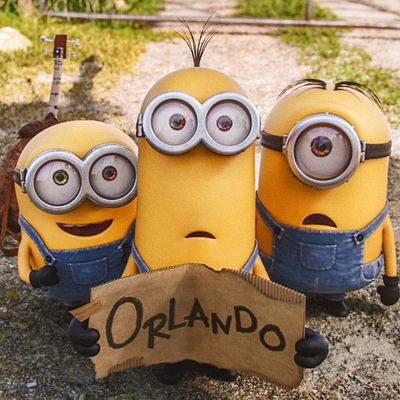
If you’re reading this, chances are that you are not the target audience for Minions, the new movie about the adventures of Despicable Me’s little army of yellow barrel-shaped henchmen. That’s not to say that you might not enjoy it. While young kids do love those adorable Minions, who have fueled a whole cottage industry of short films, toys, and video games, it’s hard not to coo a little at them even as an adult: They look like bright yellow babies and speak in a murmur of made-up words that sound vaguely like a Jawa trying to learn Italian. And not unlike the Despicable Me films before it, Minions embraces the wink-wink ludicrousness of its setup. It makes stupid safe for adults, too.
Those earlier films figured out a novel way to present a familiar story: The hero of Despicable Me, Gru, was a villain in name only; his misdeeds largely consisted of bold acts of poetic foolishness, never anything genuinely dastardly. Minions takes that same idea and waters it down even further with an origin tale that traverses centuries of not-quite-villainy. The Minions, we are told by Geoffrey Rush’s narrator, “have been on this Earth longer than us,” moving in a horde and seeking a baddie to serve. So we see them journeying through history clumsily hitching themselves to various masters and monsters — an ill-fated T. rex, a woolly mammoth, Dracula, Napoleon, etc. — all of whom they accidentally undermine. (The Minions, one should note, are utter incompetents.)
That last war fighting on the side of Napoleon results in the Minions being exiled to a vast frozen tundra, where there’s nobody to serve and their very reason for existence is thwarted. A trio of Minions — Kevin, Stuart, and Bob (the Minions all have hilariously ordinary names, because why the hell not?) — take it upon themselves to depart from the pack to find “the biggest, baddest villain to serve.” When they reach civilization, we discover that it’s now the 1960s, which really shouldn’t come as any surprise since the jazzy, pseudo-futuristic aesthetic of that decade informs this whole franchise. After traveling to “Villain Con,” a Comic-Con-like convention for bad guys, our antiheroes fall in with Scarlett Overkill (voiced by Sandra Bullock) and her doting inventor husband, Herb (voiced by Jon Hamm), who have concocted an elaborate attempt to steal Britain’s crown jewels. Meanwhile, the rest of the Minion army slowly makes its way across the world from exile, looking to reunite with their comrades.
That description makes it sound like there’s more plot to this thing than there really is. The splintered story line allows for a broader, more random array of jokes, which will prove ideal for little kids who don’t want to bother following a more fully developed story line. So we get a lot of gags based on the Minions’ cuteness and incompetence, but we also get some around the ‘60s, and Herb’s hipster pretensions, and Scarlett’s up-down temper, as well as a funny bit with a road-tripping family who turn out to be armed bank robbers. It’s all dumb, harmless fun. (Honestly, the recent controversy about a foulmouthed Minion Happy Meal toy is way edgier than anything in the movie.)
I suspect that’s partly the idea here: Minions could be sharper, smarter, tighter, better developed, but it might have also lost a certain amount of its appeal if it were. That sounds paradoxical, but we’ve become so used in recent years to animated films that try to be all things to all people — that fortify their comedy with emotional through lines and world-building and “heart” — that we sometimes forget the sense of freedom the form offers. And yes, sometimes that freedom is the freedom to show imaginary, big-eyed, noseless yellow creatures doing a bunch of inane things. You’ll laugh, but you’ll forget it all the minute the credits start rolling. And then you’ll see it again, because your child wants to, and then laugh and forget it all over again.


